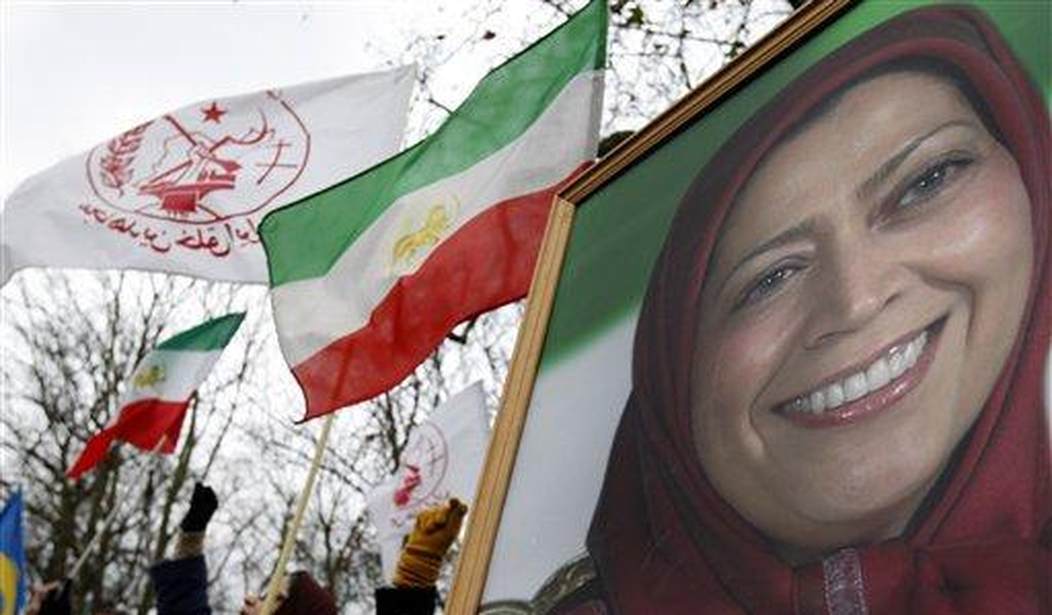After more than 45 years of clerical dictatorship, the Iranian people deserve freedom. The Islamic Republic is a terrorist regime responsible for the deaths of thousands of Americans and hundreds of thousands of civilian deaths in Iran and across the region.
A diplomatic belief in reform was always a fool’s game for two simple reasons: First, Iranian elections cannot change a regime policy set by unelected figures like Supreme Leader Ali Khamenei. Second, the Islamic Revolutionary Guard Corps exists solely to protect the theocratic regime from the Iranian people. Diplomats are naïve to believe that regime reformism is real; in reality, the reformers entrap Western officials in a game of good cop-bad cop. As former Iranian President Muhammad Khatami’s spokesman explained in 2008, “We had an overt policy, which was one of negotiation and confidence building, and a covert policy, which was continuation of the activities.”
The irony of the Iranian regime is that it has greater legitimacy among the West’s useful idiots than it does among the Iranian people. For more than a quarter century, Iranians have poured out into the streets with increasing frequency. The murder of Jina “Mahsa” Amini “Woman, Life, Freedom” Movement was the last straw for many Iranians, who openly called for death to Khamenei. Such an event may not be far off: Iran’s dictator is 85-years-old, has had cancer, and is partially paralyzed from a 1981 assassination attempt.
Iranians have myriad views about what comes next, though they also have remarkable consensus on three things:
First, they do not want external regime change. Iran is not Iraq. They want support, but will win freedom themselves, not at the barrel of a foreign gun. Second, they do not want Iran divided. When Iraqi President Saddam Hussein invaded Iran in 1980, he spoke about cleaving away “Arabistan,” his name for the traditionally Arab-populated, oil-producing province of Khuzestan. Iranians rightly rallied to defend their country from Iraq, but the distraction of war allowed Revolutionary leader Ayatollah Ruhollah Khomeini to wrap himself in a nationalist flag to avoid accountability for his revolution’s failures and betrayal. The third point of consensus is disdain for the Mujahedin-e Khalq Organization (MKO).
Recommended
This third point remains interwoven with the first two in the minds of most Iranians. The MKO—and Maryam Rajavi, for 40-years, its president-elect—were once fierce proponents of Khomeini’s Islamic Revolution. Rajavi has a right to be personally furious with Khomeini: Like he did with so many other supporters, he betrayed Rajavi and the MKO. Many MKO members fled to Iraq, Iran’s archrival that was at the time killing Iranian conscripts after having invaded the country. Most Iranians despise Khomeini—how else to explain why they would put dog excrement into his tomb—but they could not understand a group allying itself with an Arab dictator bent upon dismantling Iran itself.
Ultimately, Iranians will determine their own future, hopefully through a democratic process once the theocracy collapses. Some Iranians may support the son of the late shah as a unifying figure who can preside over a constitutional convention. Others may prefer a president, and still others may advocate for a parliamentary system presided over by a prime minister. Ethnic or religious groups dominant in one province or another may also seek greater local decision-making. Most Iranian groups debate such structures and cooperate with those with whom they disagree.
The MKO, however, stands apart in vision, in opacity, and in tactics. While Iranian women risk their lives for freedom from forced veiling, not only does Rajavi strictly cover herself, but she also requires that all the women of her group cover their hair. What Iranians want is not a different flavor of Islamic Republic, but rather no Islamic Republic.
Iranians also want democracy. Too many once believed Khomeini’s promises of democracy; they realize the danger of insincere promises. This translates into deep suspicion about the MKO. After all, how can a group that embraced first Khomeini and then Saddam stand for democracy? To suggest the MKO is pro-American is risible. Prior to the Islamic Revolution, the MKO killed American businessmen and military officers. While that was hardly unique among leftist groups during the Cold War, what makes the MKO different today is it denies its history rather than apologizes for it. Indeed, when Americans are not in the room its anti-Americanism flourishes.
The biggest problem with the MKO, however, is that it actively undermines grassroots opposition by disrupting events that do not pay homage to Rajavi or libeling or slandering those who raise questions about the MKO’s record.
I have been a victim of MKO tactics. Ali Safavi, a member of the foreign affairs committee of the National Council of Resistance of Iran, the political umbrella for the MKO, has six columns here libeling me in response to my criticism of the MKO. None of his columns address criticisms I made about the MKO. Rather, Safavi’s responses range from the bizarre to the conspiratorial: He accuses me of being an Iranian regime agent because, in his imagination, American Jews who worked in President George W. Bush’s administration and have advocated for regime change in Commentary and the Wall Street Journal over a quarter century must be closet Islamists. Sure, I went to Iran. Yale University funded me. I wrote my dissertation on telegraphy in 19th century Iran and penned several spinoff articles about Persian cryptology, Armenian and Baha’i telegraph workers, and the like. That no more makes me an Iranian agent than the many American students that the regime subsequently took hostage. By Safavi’s logic, am I also al Qaeda because I went to the Taliban’s Afghanistan? Am I a communist because I went to Cuba? In reality, my job is to study how rogue regimes think, and I consider the Islamic Republic the marquee rogue.
Washington policy debate is rough-and-tumble. During the Iraq war, partisans cast aspersions easily. Those that Safavi repeats—about my supposed role shepherding Ahmad Chalabi—originated in convicted fraudster Lyndon LaRouche’s magazine (Actually, I worked mostly with Iraqi Kurds). Ditto, a New York Times reporter once accused me of being part of the Lincoln Group, which planted news stories in the Iraqi press. Sorry, Ali. Congress investigated the Lincoln Group; I was not part of it. Don’t be the only Townhall columnist that takes the New York Times at face value. And don’t be the only Iranian who, with the Chalabi calumny, appears to lament Saddam’s fall.
I’ve got thick skin, but such tactics matter. First, how can Washington policymakers take the MKO seriously when it cites LaRouche as a reliable source? Or deflects policy debate with ad hominem attacks? Or argues that security-cleared, American Jewish neoconservative Iran hawks are really just closet Revolutionary Guards agents?
More seriously, the aspersions Safavi casts toward me are mild compared to how the MKO treats the Iranian opposition. Rather than work jointly toward the goal of ending an odious regime in Tehran, the MKO would rather attack any Iranians who do not blindly submit to Rajavi, live in her group homes, and fork over their income and, in some cases, children.
During the Cold War, there were Communists, anti-Communists, and anti-anti-Communists who cared more about knocking down critics of the Soviet Union than about defeating the Evil Empire itself. This is the dynamic now at play with the MKO as it obsessively attacks critics of the Islamic Republic. There could be no bigger gift to Khamenei than the MKO’s efforts to delegitimize its critics.
Michael Rubin is a senior fellow at the American Enterprise Institute and director of policy analysis at the Middle East Forum.

























Join the conversation as a VIP Member